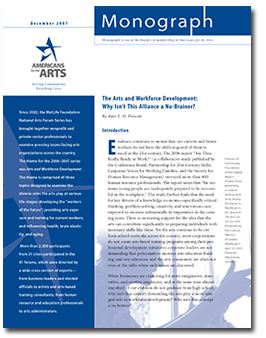Since 2002, the MetLife Foundation National Arts Forum Series has brought together nonprofit and private-sector professionals to examine pressing issues facing arts organizations across the country. The theme for the 2006–2007 series was Arts and Workforce Development. The theme is comprised of three topics designed to examine the diverse roles the arts play at various life stages: developing the “workers of the future”; providing arts exposure and training for current workers; and influencing health, brain elasticity, and aging.
Americans for the Arts’ Monograph series featured in-depth issue papers on topics that were of the greatest interest to our members and arts professionals at the time. They often still serve as excellent resources for best practices and historic reference for today’s issues. Monographs were produced from 1993–2010. Monographs from 2001-2010 are available for downloadable in PDF format our online store at a nominal fee for nonmembers but free to members. All monographs from 1993-2000 are available for free download via the National Arts Administration and Policy Publications Database.
More than 2,300 participants from 21 cities participated in the 41 forums, which were directed by a wide cross section of experts—from business leaders and elected officials to artists and arts-based training consultants, from human resource and education professionals to arts administrators.


Most Commented